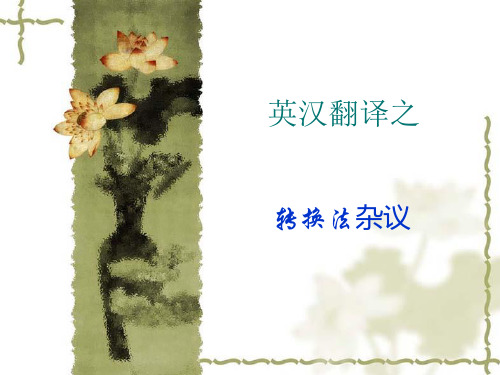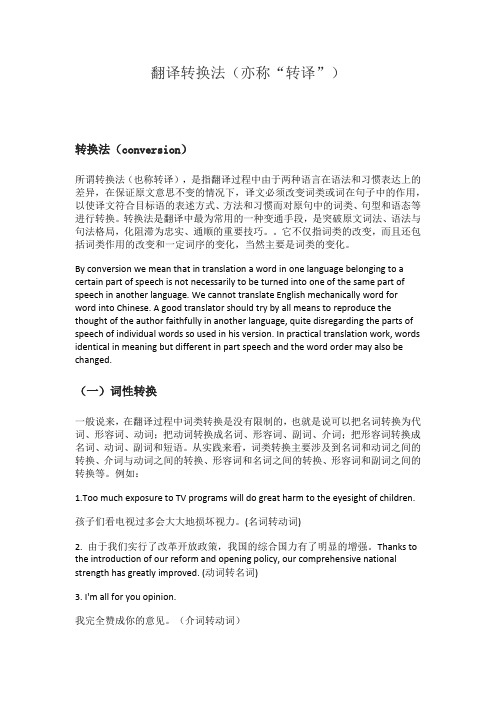2013翻译转译法
转译法精选全文

进大学要考试,择优录取。女生入学条件与男生 一样。
②带er或or的名词,如teacher, thinker等,有时在句中 并不指其身份和职业,而是含有较强的动作意味。在汉 语中没有恰当的对应名词时,往往可以转译为动词。
随着北京变得越来越拥挤,污染问题日益严重, 人们更加意识到需要采取行动来解决这些问题。
With the improvement of the living standard, now people attach great importance to health.
随着生活水平的提高,人们现在很重视健康。
偶尔下一点毛毛雨,断断续续的闪电使得我们不时 忧虑地朝那儿望去。
It was a clear and unemotional exposition of the President's reasons for willing to begin a Chinese-American dialogue.
他对这城市完全陌生,所以我希望你能给他必要 的帮助。
Independent thinking is an absolute necessity in study.
独立思考对学习是绝对必需的。
二、 名词可转译成动词 ① 含有动作意味的名词 (在记叙、描写文体中
出现较多) 往往可以转译成动词。
这些材料的特点是:绝缘性好,耐磨性强。
To them, he personified the absolute power. 在他们看来,他就是绝对权威的化身。
转性译法

• Carlisle street runs westwards, across a great black bridge, down a hill and up again, by little shops and meat markets, past single-storide homes, until suddenly it stops against a wide green lawn. 卡列斯尔大街向西伸展,越过一座黑色大桥,爬 下山冈又爬上山冈,经过许多小铺和肉市,经过 一些平房,然后突然对着一大片绿色草坪终止了。 It is clear that numerical control is the operation of machine tools by numbers. 很清楚,数控就是机床采用数字操纵
• They were quite content with the data obtained from the experiment. 他们十分满意试验中获得的数据。 I would be so grateful if you could do it. 如果你能这样做,我将十分感激。 ②.表示动作和状态以现在分词或过去分词形式 出现的形容词,也常常转译为动词。 We believe that Europe should and will be outward-looking. 我们认为,欧洲应该而且必将向外看。 英语形容词转译为名词 ①.英语中,有些表示事物特征的形容词作表语 时,往往转译为名词。 In the fission processes the fission fragments are very radioactive. 在裂变过程中,裂变碎片具有较强的放射性。 。
• 英语代词的转换 英语中常常使用代词来替代上文中出现过的名词, 以避免重复,故代词使用较多;而中文则喜欢重 复,故名词较多。翻译时如果按原文的代词直接 译出,则译文读起来翻译腔十足,有时还会指代 不清、造成歧义。可根据中文的表达习惯,把英 文的代词转译成它所替代的名词。 英语形容词的转换 • 英语形容词转译为动词。 ①.英语中只有动词可以直接作谓语,其他词性 的词在做谓语时,常常需要系动词的帮助才可以 构成谓语。因此,在翻译中一些表示知觉、情感、 欲望等心理状态或标识存在状态的形容词在与系 动词结构构成复合谓语时,可将形容词译成动词;
英语翻译转换法

Part of speech conversion
要点一
Noun verb conversion
conversion method • The advantages, disadvantages, and
improvement directions of translation conversion method
01
Overview of Translation Conversion Method
Adjusting presence structure
Modifying presence structure to accommodate voice changes, such as rearranging phrases or clauses
Tense transition
Shifting tense
Inserting
appropriate
connections (e.g., connections,
adapters)
to
clarify
relationships between ideas
and enhance coherence
Voice conversion
Active to passive
Using temporary markers
Inserting words or phrases that indicate time (e.g., "yesterday," "in the future") to clarify tense usage
日语翻译中的转译

日语翻译中的转译作者:李娟来源:《教育教学论坛》2013年第43期摘要:在外语的学习中,翻译能力是一项必不可少的能力。
翻译有很多翻译方法,今天就转译来做一下介绍和分析。
本文将具体解释转译的定义,介绍转译的方式。
通过例句来具体分析在翻译过程中转译的运用。
关键词:转译;转换;汉语;日语中图分类号:G642.4 文献标志码:A 文章编号:1674-9324(2013)43-0142-03转译指根据不同的情况,对原文做出不影响原文信息内容表达﹑非原则性的变通。
特点是行文不拘一格,灵活多变,在思维方式上,在表达形式上,在句子结构上都可以打破原文的程式以独特的﹑新颖的形式来完成语际间的转换。
方式有词性转换﹑句式转换﹑语态转换和语气转换等。
一、词性的转换汉语翻译成日语时词性的转换是非常普遍的,常见的词性转换有动词转换为动名词、动词或者副词转换为形容词或者形容词词组、数量及动量词转换为动词、形容词转换为动词、形容词转换为拟声拟态词等等。
例句1:他具有一种能力,能从对方含糊暧昧的言语中,准确抓住对方要说的真意。
译文:彼はぼんやりとした言葉からでも的確に相手の言いいたいところをとらえる能力を持っている。
原句中“暧昧的”是用来修饰“言语”,作为形容词使用,但是在译文中译成了“ぼんや,りとした”这样的拟态词作为连体形来修饰后边的名词,更形象,更生动。
而且,原文中的“他具有一种能力”,在译文中把主谓部分拆开了,使后边的句子都做了能力的定语,可以说给人的感觉更地道,更自然。
例句2:电梯很大,足可以放下两张床。
这个电梯安装在体弱多病的老人居住的大楼上,是非常周到的。
译文:エレベーターは、ベッドが二つ楽々入れられるほどの大きさで、老人に多い病弱な人々の住む建物のエレベーターとして、なんと行き届いていることか。
原句中的“大”,在译文中译成了名词“大きさ”。
动词“安装”在译文中译成了“として”。
另外原句的“是非常周到的”在译文中译成了感叹句“なんと行き届いていることか”,这样的语气更加强烈,详细例子在语气转换中再做说明。
英汉翻译之转换法

The question of forcible diversion of civil aircraft in flight was considered by the General on as an important and urgent matter.
The board decides how school funds are to be allocated, and has some voice in establishing the curriculum.
While some subjects are required of everyone, some high school students, in addition, take vocational classes.
Mattie’s hand was underneath, and Etan kept his clasped on it a moment longer than necessary (握的比必要的时间长了一会儿。)?.
❖ 反说正译:
经典译例
As I approve of a youth that has something of the old man in him, so I am no less pleased with an old man that has something of the youth. He that followed this rule may be old in body, but can never be so in mind.
翻译转换法(亦称“转译”)

翻译转换法(亦称“转译”)转换法(conversion)所谓转换法(也称转译),是指翻译过程中由于两种语言在语法和习惯表达上的差异,在保证原文意思不变的情况下,译文必须改变词类或词在句子中的作用,以使译文符合目标语的表述方式、方法和习惯而对原句中的词类、句型和语态等进行转换。
转换法是翻译中最为常用的一种变通手段,是突破原文词法、语法与句法格局,化阻滞为忠实、通顺的重要技巧。
它不仅指词类的改变,而且还包括词类作用的改变和一定词序的变化,当然主要是词类的变化。
By conversion we mean that in translation a word in one language belonging to a certain part of speech is not necessarily to be turned into one of the same part of speech in another language. We cannot translate English mechanically word for word into Chinese. A good translator should try by all means to reproduce the thought of the author faithfully in another language, quite disregarding the parts of speech of individual words so used in his version. In practical translation work, words identical in meaning but different in part speech and the word order may also be changed.(一)词性转换一般说来,在翻译过程中词类转换是没有限制的,也就是说可以把名词转换为代词、形容词、动词;把动词转换成名词、形容词、副词、介词;把形容词转换成名词、动词、副词和短语。
转译法

每天早上,她都要到湖区去散步。
The operation of a computer needs some knowledge of English.
操作电脑需要一些英文知识。
She jumped up for joy at the news of her husband’s return.
听到丈夫要回来这个好消息,她高兴地跳了起来。
Admission to the university is by examination and selection. Girls are admitted on equal terms with boys.
转译法
由于英语和汉语在句子结构和表达习 惯上的不同,机械地把英语的某一词 类译成汉语的同一词类,把英语的某 一成分,译成汉语的同一成分,显然 是不行的(反之亦然),有时需要转 换一下。这种做法,翻译界把它称为 “转换译法”或简称“转译法”。转 译法大量体现在词类转译和成分转译 上。
词类转换译法 Conversion of Words
They were considered insincere. 他们被认为是伪君子。 ③ 由名词派生的形容词可转译成名词。
The Wilde family were religious. 王尔德全家都是虔诚的教徒。
五、形容词转译成动词
①英语中形容词,尤其是表示感觉和感情的形容 词,往往具有动词的意义。因此在英译汉时表示 感觉和感情的形容词,在系动词后作表语时,往 往 可 以 译 成 动 词 。 如 : confident, certain, careful, cautious, angry, sure, ignorant, afraid, doubtful, aware, concerned, glad, delighted, sorry, ashamed, thankful, anxious 等。
转译法

• We must make full use of the natural resources available • 我们应当充分利用现有的自然资源。
• IV conversion of adv • 1 adv---adj • The English language has changed subtly and pervasively. pervasively. • 英语的变化很敏感,很普遍。 英语的变化很敏感,很普遍。 • She looked at me expectantly. • 她用期待的眼光看着我。 她用期待的 期待的眼光看着我。 • Hopefully, it will be done early next month. Hopefully, • 下月初完成这项工作是大有希望的。 下月初完成这项工作是大有希望的 大有希望的。
• 3. Stevenson was eloquent and elegant— elegant— but soft. • 史蒂文森有口才、有风度,但很软弱。 史蒂文森有口才 口才、有风度 风度,但很软弱。 • 4. This problem is no less important than that one. • 这个问题的重要性不亚于那个问题。 这个问题的重要性 重要性不亚于那个问题。
• Doctor have said that they are not sure they can save his life. • 医生说,他们不敢肯定能否救得了他的 命。 • Scientists are confident that all matter is indestructible. • 科学家们深信,所有物质都是不灭的。
• 2. v---adv • In his six consecutive speeches, John indulged in violent attacks on the Baghdad government. • 在接连六次的演讲杂种,约翰一味地对巴格 达政府进行猛烈的攻击。 • He said, if this was the case, he would be tempted to try. • 他说,如果情况是这样,他颇有跃跃欲试之 意。
- 1、下载文档前请自行甄别文档内容的完整性,平台不提供额外的编辑、内容补充、找答案等附加服务。
- 2、"仅部分预览"的文档,不可在线预览部分如存在完整性等问题,可反馈申请退款(可完整预览的文档不适用该条件!)。
- 3、如文档侵犯您的权益,请联系客服反馈,我们会尽快为您处理(人工客服工作时间:9:00-18:30)。
英译汉翻译技巧:转换法转换法指翻译过程中为了使译文符合目标语的表述方式、方法和习惯而对原句中的词类、句型和语态等进行转换。
具体的说,就是在词性方面,把名词转换为代词、形容词、动词;把动词转换成名词、形容词、副词、介词;把形容词转换成副词和短语。
在句子成分方面,把主语变成状语、定语、宾语、表语;把谓语变成主语、定语、表语;把定语变成状语、主语;把宾语变成主语。
在句型方面,把并列句变成复合句,把复合句变成并列句,把状语从句变成定语从句。
在语态方面,可以把主动语态变为被动语态。
(一)转译成动词1. 名词转译为动词The very sight of it makes me nervous一看到他,我就感到紧张。
A careful study of the original text will give you a better translation.仔细研究原文,你会翻译得更好。
He is a good singer.他唱歌唱得好。
Too much exposure to TV programs will do great harm to the eyesight of children. 孩子们看电视过多会大大地损坏视力。
(名词转动词)Too little brushing and too many sweets can cause tooth decay, sometimes very seriously.极少刷牙和吃太多的糖果会导致蛀牙,有时会非常严重。
2. 形容词转译成动词常见的有:与思维和知觉相关的形容词:aware, conscious, certain, sure, ignorant(无知的), alert等;与情感相关的形容词:glad, pleased, cautious, careful, angry, happy, excited, confident, thankful, grateful, concerned, eager, afraid, doubtful, sorry等;I am anxious about his health.我担心他的身体健康。
(2)Scientists are confident that all matter is indestructible.科学家们都深信,所有的物质都是不灭的。
3. 副词转译成动词She opened the window to let fresh air in.她把窗子打开,让新鲜空气进来。
That day he was up before sunrise.那天他在日出以前就起来了4. 介词转动词I’m all for your opinion.我完全赞成你的意见。
(二)转译成名词1. This kind of behavior characterizes the criminal mind.这种举止是罪犯的心理特征。
2. They did their best to help the sick and the wounded.他们尽了最大的努力帮助病号和伤员。
(三)、转译成形容词1. Our performance was a success.我们的演出很成功。
2. Independent thinking is an absolute necessity in study. 独立思考对学习是绝对必需的。
(四)、其它词类转译由于英语中的动词在翻译的时候可以转换成汉语名词,所以修饰该动词的副词往往转译成形容词。
This film impressed him deeply. 这部电影给了他深刻的印象。
注意:出于英、汉两种语言结构和表达习惯上的差异,转换法将原文中某一词类在译文中予以转换,或名词变动词,或形容词、介词短语变动词,或动词变名词等等,以使译文表达更准确更流畅。
一般而言,汉语喜用动词铺排的流水句,且形容词可单独做谓语;英语则常用分词短语、不定式等非谓语动词形式或介词、形容词、名词短语等与句中主动词(SV结构)构成上下递叠的句式结构。
因而,词性转换法在英—汉、汉—英翻译中使用得极其频繁,是翻译的主要手段之一。
Beggars can’t be choosers.花子不可挑三拣四。
(n---v)例2. After two years with a bad woman a good man becomes a bad man.两年交坏女,好男也变坏。
(prep.--v.例3. 她和我谈了八个小时,中间还吃了一顿饭,一直谈到深夜。
She talked with me for eight hours through dinner and well into the middle night.(v--prep)例4.With the unemployment high, the dollar low and the stock market in distress, the economy will be the president’s sternest trial.由于失业率增高,美元贬值,股市下跌,经济问题将是总统面临的最严峻考验。
(prep & adj.----V例5.Passing through the gorge, across the stream and then up the mountain, they looked down from the top into the distance, an expense of flat land lying before them.他们穿过峡谷,跨过溪流,登上山顶极目远眺,山下是一马平川。
(prep.---v) 例 6. In the stinging rain and the chilling snow she toils uncomplainingly and unceasingly living wholly in the hope of her success some day.冷雨如针,寒雪刺骨,她不怨不弃,做着苦工,完全生活在有朝一日会发迹的希望之中。
(adv.—v; n.—v)Practice and Enjoy.(1) 我们学院受教委和市政府的双重领导。
Our institute is co-administrated by the States Education Commission and the municipal government. (名词转动词)2) Too much exposure to TV programs will do great harm to the eyesight of children.孩子们看电视过多会大大地损坏视力。
(名词转动词)(3) 由于我们实行了改革开放政策,我国的综合国力有了明显的增强。
Thanks to the introduction of our reform and opening policy, our comprehensive national strength has greatly improved. (动词转名词)(4) I’m all for you opinion.我完全赞成你的意见。
(介词转动词)(5) The reform and opening policy is supported by the whole Chinese people.改革开放政策受到了全中国人民的拥护。
(动词转名词)(6) In his article the author is critical of man’s negligence toward his environment.作者在文章中,对人类疏忽自身环境作了批评。
(形容词转名词)(7) In some of the European countries, the people are given the biggest social benefits such as medical insurance.在有些欧洲国家里,人民享受最广泛的社会福利,如医疗保险等。
(被动语态转主动语态)(8) 时间不早了,我们回去吧!We don’t have much time left. Let’s go back. (句型转换)(9) 学生们都应该德、智、体全面发展。
All the students should develop morally, intellectually and physically. (名词转副词)Practice after class补充练习一:英语对与错(2)——中国式英语他想再买一辆车。
( ) He wahts to buy another car.( ) He is thinking of buying another car.( ) He thinks to buy another car.我们星期二考化学。
( ) We will (are going to) have a rest in chemisty Tuesday.( ) We are having an examination in chemistry Tuesday.李教授(给学生)讲授古代希腊文学。
( ) Professor Li lectured ( to the students) on ancient Greek literature. ( ) Professor Li lectured the students on ancient Greek literature.他不顾困难把工作完成了。
( ) In spite of difficulties, he got the job done.( ) He was in spite of difficulities and got the job done.我卧病三天。
( ) I stayed in bed for three days.( ) I kept to my bed for threee days.( ) I slept in my bed for three days.她梦想总有一天会去巴黎。
( ) She dreamed of going to Paris someday.( ) She dreamed that some day she would go to Paris.( ) She dreamed to go to Paris some day.约翰的这个朋友是个木匠。
( ) This old fr iend of John’s is a carpenter.( ) This John’s old friend is a carpenter.彼得容易感冒。
